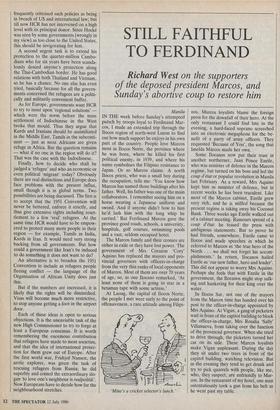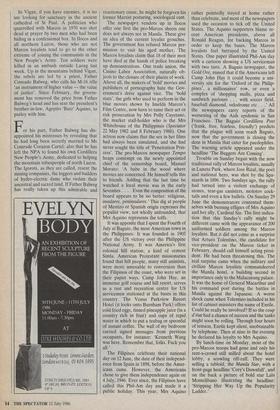STILL FAITHFUL TO FERDINAND
Richard West on the supporters
of the deposed president Marcos, and Sunday's abortive coup to restore him
Manila IN THE week before Sunday's attempted putsch by troops loyal to Ferdinand Mar- cos, I made an extended trip through the 'locos region of north-west Luzon to find out how much support he enjoys in his own part of the country. People love Marcos most in Ilocos Norte, the province where he was born, where he killed his first political enemy, in 1939, and where his name symbolises the Filipino resistance to Japan. Or so Marcos claims. A north Ilocos priest, who was a small boy during the occupation, tells me: 'You know how Marcos has named those buildings after his father. Well, his father was one of the main collaborators. I remember seeing him on a horse wearing a Japanese uniform and sword. And if anyone didn't bow to him he'd lash him with the long whip he carried.' But Ferdinand Marcos gave the province good roads, schools, a university, hospitals, golf courses, swimming pools and a vast, seldom occupied hotel.
The Marcos family and their cronies are either in exile or they have lost power. The government of Mrs Corazon 'Cory' Aquino has replaced the mayors and pro- vincial governors with officers-in-charge from the very thin ranks of local opponents of Marcos. Most of them are over 70 years of age, so, as one Ilocano remarked, 'At least none of them is going to star in a betamax tape with some actress.'
At Laoag, the capital of Ilocos Norte, the people I met were surly to the point of offensiveness, a rare attitude among Filipi- `Mine's a cricket selector's lunch.' nos. Marcos loyalists blame the foreign press for the downfall of their hero. At the only restaurant I could find late in the evening, a hard-faced soprano screeched into an electronic megaphone for the be- nefit of a party of army officers. They requested 'Because of You', the song that Imelda Marcos made her own.
Some Ilocanos now put their trust in another northerner, Juan Ponce Enrile, who was minister of defence in the Marcos regime, but turned on his boss and led the coup d'etat or popular revolution in Manila last February. As a reward, Mrs Aquino kept him as minister of defence, but in recent weeks he has been truculent. Like most of the Marcos cabinet, Enrile grew very rich, and he is miffed because the present regime is taking away his Coconut Bank. Three weeks ago Enrile walked out of a cabinet meeting. Rumours spread of a coup d'etat: he teased the press with ambiguous statements. But to prove he had friends, somewhere, Enrile came to Ilocos and made speeches in which he referred to Marcos as 'the true hero of the North . . . we shall not forget his accom- plishments.' In return, Ilocanos hailed Enrile as 'our new father, hero and leader'. This did not appear to worry Mrs Aquino. Perhaps she feels that with Enrile in the government, the llocanos might stop sulk- ing and hankering for their king over the water.
In Ilocos Sur, not one of the mayors from the Marcos time has handed over his post to the officer-in-charge appointed by Mrs Aquino. At Vigan, a gang of picketers wait in front of the capitol building to block the officer-in-charge, Mrs Rosalia 'Sally' Villanueva, from taking over the function of the provincial governor. When she tried to drive through, the picketers turned her car on its side. These Marcos loyalists make Vigan unpleasant. During the day they sit under two trees in front of the capitol building, watching television. But in the evening they tend to get drunk and try to pick quarrels with people, like me, who, they suspect, are unfriendly to Mar- cos. In the restaurant of my hotel, one man ostentatiously took a gun from his belt as he went past my table. In Vigan, if you have enemies, it is no use looking for sanctuary in the ancient cathedral of St Paul. A politician who quarrelled with Marcos in 1970 was shot dead at prayer by two men who had been hiding in a confessional box. In Ilocos and all northern Luzon, those who are not Marcos loyalists tend to go to the other extreme of joining the communists in the New People's Army. Ten soldiers were killed in an ambush outside Laoag last week. Up in the mountains behind Vigan, the rebels are led by a priest, Father Conrado Balweg, who calls his M-16 rifle `an instrument of higher value — the value of justice'. Since February, the govern- ment has removed the price from Father Balweg's head and has sent the president's brother-in-law, Agepito 'Butz' Aquino, to parley with him.
For his part, Father Balweg has dis- appointed his mistresses by revealing that he had long been secretly married to Ms Comrade Corazon Cartel: also that he has left the NPA to found his own Cordillera New People's Army, dedicated to helping the mountain tribespeople of north Luzon. The Igorots, as they are called, resent the mining companies, the loggers and builders of hydro-electric dams who violate their ancestral and sacred land. If Father Balweg has really taken up this admirable and reactionary cause, he might be forgiven his former Marxist posturing, sociological cant.
The newspaper vendors up in Ilocos offer one first the pro-Marcos sheets one does not always see in Manila. These give an idea of the current loyalist grouches. The government has refused Marcos per- mission to visit his aged mother. The Marcos loyalists claim that 18 of their men have died at the hands of police breaking up demonstrations. One trade union, the Casino Labor Association, naturally ob- jects to the closure of their places of work. Above all, the makers of 'bold' movies and publishers of pornography hate the Gov- ernment's drive against vice. The 'bold stars', the girls who used to perform in the blue movies shown by Imelda Marcos's Film Centre, now have to tame their act or risk prosecution by Mrs Polly Cayetano, the market stall-holder who is the Mrs Whitehouse of the Philippines (Spectator 22 May 1982 and 8 February 1986). One actress now claims that the sex in her films had always been simulated, and she had never sought the title of 'Penetration Prin- cess'. The pro-Marcos newspaper Tempo heaps contempt on the newly appointed chief of the censorship board, Manuel Morato: 'A babe in the wood where movies are concerned. He himself tells this to friends. Adding that the last time he watched a local movie was in the early Seventies . . . . Even the composition of the board appears to be no better: religious, insulares, peninsulares.' This dig at people of Mestizo or Spanish origin expresses the populist view, not wholly unfounded, that Mrs Aquino represents the toffs.
It was apposite that I spent the Fourth of July at Baguio, the most American town in the Philippines. It was founded in 1903 after the US victory over the Philippine National Army. It was America's first colonial hill station, a kind of cement Simla. American Protestant missionaries found that hill people, many still animists, were more amenable to conversion than the Filipinos of the coast, who were set in their papist ways. Camp John Hay, an immense golf course and hill resort, serves as a rest and recreation centre for US servicemen stationed at the bases in this country. The Venus Parkview Resort Hotel (it looks onto Burnham Park) offers cold fried eggs, tinned pineapple juice (in a country rich in fruit) and cups of tepid water in which to put a teabag or spoonful of instant coffee. The wall of my bedroom carried signed messages from previous occupants, for instance: 'Kenneth Wang was here. Remember that, folks. Fuck you all.'
The Filipinos celebrate their national day on 12 June, the date of their independ- ence from Spain in 1898, before the Amer- icans came. However, the Americans chose to give them independence again on 4 July, 1946. Ever since, the Filipinos have called this Phil-Am day and made it a public holiday. This year, Mrs Aquino rather pointedly stayed at home rather than celebrate, and most of the newspapers used the occasion to tick off the United States. The Aquino supporters blame re- cent American presidents, above all Ronald Reagan, for backing Marcos in order to keep the bases. The Marcos loyalists feel betrayed by the United States. One paper illustrated Phil-Am day with a cartoon showing a US serviceman with two tarts. A Baguio newspaper, the Gold Ore, mused that if the Americans left Camp John Hay it could become a uni- versity site for the 'Oxford of the Philip- pines', a millionaires' row, or even a complex of 'shopping malls, pizza and sandwich parlours . . with soccer field, baseball diamond, velodrome etc . . All the newspapers carry reports of the worsening of the Aids epidemic in San Francisco. The Baguio Cordillera Post (`frank, free, fearless, friendly') predicts that the plague will soon reach Baguio, now that the government is closing the dens in Manila that cater for paedophiles. The warning article appeared under the headline 'The Buggers Are Coming'.
Trouble on Sunday began with the now traditional rally of Marcos loyalists, usually in Luneta Park, where Jose Rizal, the poet and national hero, was shot by the Spa- niards in 1896. Two Sundays ago, the rally had turned into a violent exchange of stones, tear-gas canisters, molotov cock- tails and even a few bullets. On Sunday 29 June the demonstrators contented them- selves with burning effigies of Mrs Aquino and her ally, Cardinal Sin. The first indica- tion that this Sunday's rally might be different came with the appearance of 200 uniformed soldiers among the Marcos loyalists. But it did not come as a surprise that Arturo Tolentino, the candidate for vice-president on the Marcos ticket in February, should call himself acting presi- dent. He had been threatening this. The real surprise came when the military and civilian Marcos loyalists commandeered the Manila hotel, a building second in importance only to the Malacanang palace. It was the home of General Macarthur and his command post during the battles in Manila against the Japanese. A worse shock came when Tolentino included in his list of cabinet ministers the name of Enrile. Could he really be involved? If so the coup d'etat had a chance of success and the tanks might soon be rolling. Through four hours of tension, Enrile kept silent, unobtainable by telephone. Then at nine in the evening he declared his loyalty to Mrs Aquino.
By lunch-time on Monday, most of the pro-Marcos troops had gone and only his rent-a-crowd still milled about the hotel lobby, a scowling riff-raff. They were selling a tabloid, the Manila Star, with a front-page headline 'Cory's Downfall', and on the back a picture of bold star Lala Montelibano illustrating the headline: `Stripping Her Way Up the Popularity Ladder.'



















































 Previous page
Previous page